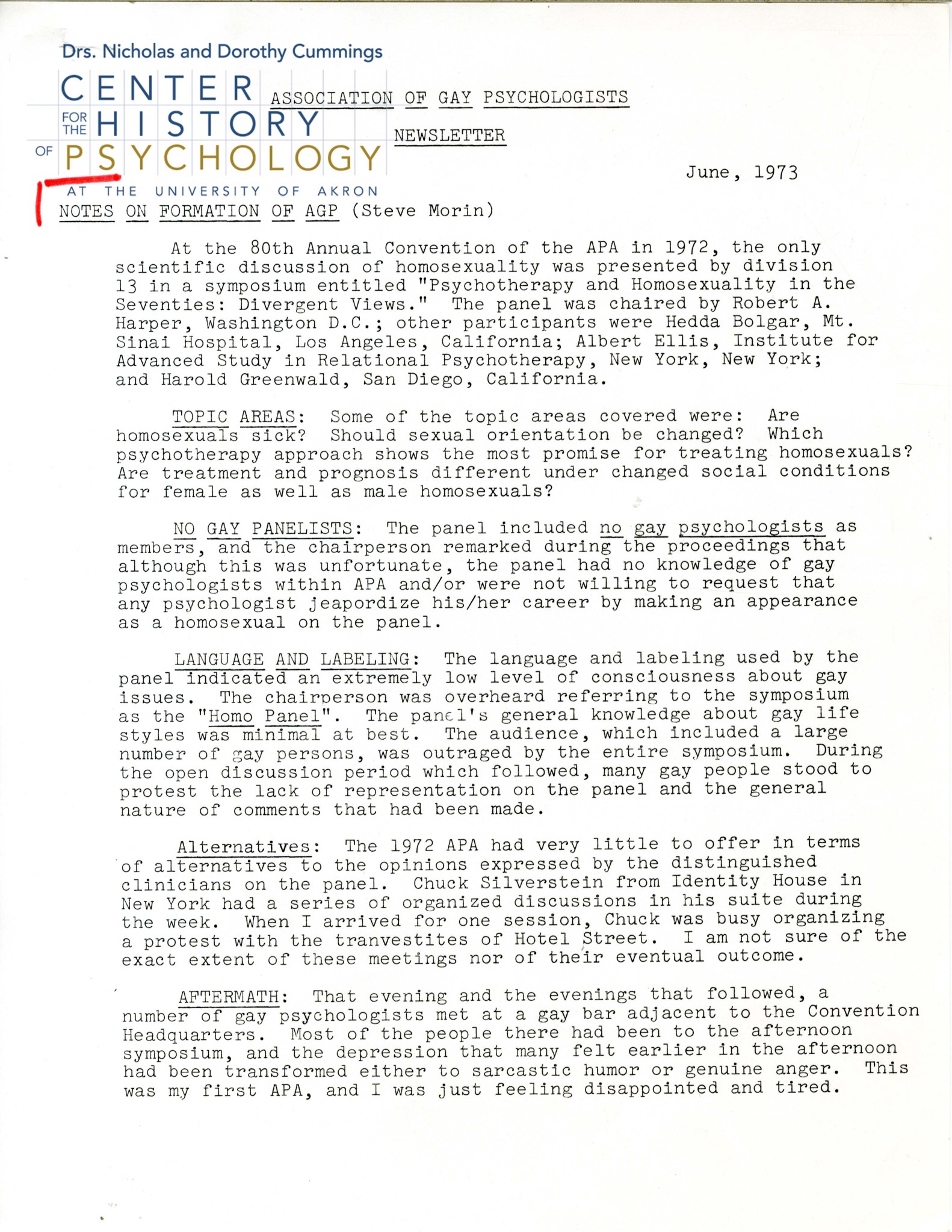Stephen Morin recounts the formation of the Association of Gay Psychologists.
- Type
- Periodical
- Hearsay
- Direct
- Reference
Steve Morin, "Notes on the Formation of AGP," Association of Gay Psychologists Newsletter, June 1973
- Scribe/Publisher
- Association of Gay Psychologists
- Audience
- Association of Gay Psychologists
- Transcription
ASSOCIATION OF GAY PSYCHOLOGISTS NEWSLETTER
NOTES ON FORMATION OF AGP (Steve Morin)
June, 1973
At the 80th Annual Convention of the APA in 1972, the only scientific discussion of homosexuality was presented by division 13 in a symposium entitled "Psychotherapy and Homosexuality in the Seventies: Divergent Views." The panel was chaired by Robert A. Harper Washington D.C.; other participants were Hedda Bolgar, Mt. Sinai Hospital, Los Angeles, California; Albert Ellis, Institute for Advanced Study in Relational Psychotherapy, New York, New York; and Harold Greenwald, San Diego, California.
TOPIC AREAS: Some of the topic areas covered were: Are homosexuals sick? Should sexual orientation be changed? Which psychotherapy approach shows the most promise for treating homosexuals? Are treatment and prognosis different under changed social conditions for female as well as male homosexuals?
NO GAY PANELISTS: The panel included no gay psychologists as members, and the chairperson remarked during the proceedings that although this was unfortunate, the panel had no knowledge of gay psychologists within APA and/or were not willing to request that any psychologist jeapordize his/her career by making an appearance as a homosexual on the panel.
LANGUAGE AND LABELING: The language and labeling used by the panel Indicated an extremely low level of consciousness about gay issues. The chairperson was overheard referring to the symposium as the "Homo Panel". The panel's general knowledge about gay life styles was minimal at best. The audience, which included a large number of gay persons, was outraged by the entire symposium. During the open discussion period which followed, many gay people stood to protest the lack of representation on the panel and the general nature of comments that had been made.
Alternatives: The 1972 APA had very little to offer in terms of alternatives to the opinions expressed by the distinguished clinicians on the panel. Chuck Silverstein from Identity House in New York had a series of organized discussions in his suite during the week. When I arrived for one session, Chuck was busy organizing a protest with the transvestites of Hotel Street. I am not sure of the exact extent of these meetings nor of their eventual outcome.
AFTERMATH: That evening and the evenings that followed, number of gay psychologists met at a gay bar adjacent to the Convention Headquarters. Most of the people there had been to the afternoon symposium, and the depression that many felt earlier in the afternoon had been transformed either to sarcastic humor or genuine anger. This was my first APA, and I was just feeling disappointed and tired.
- Citations in Mormonr Qnas
The B. H. Roberts Foundation is not owned by, operated by, or affiliated with the Church of Jesus Christ of Latter-day Saints.

